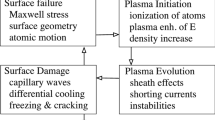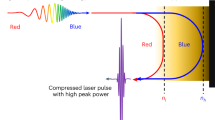Abstract
EXPERIMENTS have recently been described1 showing that at frequencies of 2,800 Mc./sec. and 9,800 Mc./sec. the breakdown of air takes place at stresses some 30 per cent lower than the breakdown values for steady voltages, for gaps of a few millimetres. In order to extend the observations to longer gaps, experiments are in progress on discharges in cavity resonators, where the necessary stress can be built up over longer gaps. Power is obtained from a magnetron excited by 1 microsecond pulses applied either individually or at the rate of 400 per second.
This is a preview of subscription content, access via your institution
Access options
Subscribe to this journal
Receive 51 print issues and online access
$199.00 per year
only $3.90 per issue
Buy this article
- Purchase on Springer Link
- Instant access to full article PDF
Prices may be subject to local taxes which are calculated during checkout
Similar content being viewed by others
References
Cooper, R., J. Inst. Elect. Eng., 94, Pt. 3, 315 (Sept. 1947).
Author information
Authors and Affiliations
Rights and permissions
About this article
Cite this article
PROWSE, W., COOPER, R. Gas Discharges at Centimetre Wave-lengths. Nature 161, 310–311 (1948). https://doi.org/10.1038/161310b0
Issue Date:
DOI: https://doi.org/10.1038/161310b0
This article is cited by
Comments
By submitting a comment you agree to abide by our Terms and Community Guidelines. If you find something abusive or that does not comply with our terms or guidelines please flag it as inappropriate.



